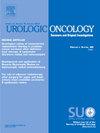Utilization of genetic evaluation in patients with kidney cancer who meet guidelines for genetic referral
IF 2.3
3区 医学
Q3 ONCOLOGY
Urologic Oncology-seminars and Original Investigations
Pub Date : 2025-08-14
DOI:10.1016/j.urolonc.2025.06.009
引用次数: 0
Abstract
Purpose
To assess the prevalence of genetic counseling and germline genetic testing among patients diagnosed with kidney cancer (KCa) who meet national guidelines for genetic evaluation.
Materials and methods
We conducted a retrospective chart review of adult patients treated between 2017 and 2022 with early onset (diagnosis at ≤ 46 years) or bilateral renal cell carcinoma. Electronic medical records were reviewed to determine rates of referral for genetic services, completion of genetic counseling, and germline genetic testing.
Results
Of the 123 patients who met criteria for genetic evaluation, 42 (34%) were referred to genetic counseling, 32 (26%) completed genetic counseling, and 27 (22%) underwent germline testing. Of the 24 patients with available test results, 7 (29%) had pathogenic or likely pathogenic variants, including 2 (8%) with variants in genes associated with renal cell carcinoma.
Conclusion
Despite current guidelines recommending genetic counseling for all patients with early-onset or bilateral KCa, referral rates remain low, with only one-third of eligible patients receiving a referral. However, once referred, most patients completed counseling and testing. These findings underscore a critical gap in the implementation of genetic evaluation guidelines and highlight opportunities to improve access and streamline referral pathways for patients with KCa.
遗传评估在符合遗传转诊指南的肾癌患者中的应用。
目的:评估符合国家遗传评估指南的肾癌(KCa)患者遗传咨询和种系基因检测的流行程度。材料和方法:我们对2017年至2022年间治疗的早发(诊断年龄≤46岁)或双侧肾细胞癌的成人患者进行了回顾性图表回顾。对电子病历进行审查,以确定遗传服务转诊率、遗传咨询完成率和种系基因检测率。结果:在符合遗传评估标准的123例患者中,42例(34%)进行了遗传咨询,32例(26%)完成了遗传咨询,27例(22%)进行了种系检测。在可获得检测结果的24例患者中,7例(29%)具有致病性或可能致病性变异,其中2例(8%)具有与肾细胞癌相关的基因变异。结论:尽管目前的指南建议对所有早发性或双侧KCa患者进行遗传咨询,但转诊率仍然很低,只有三分之一的符合条件的患者接受转诊。然而,一旦转诊,大多数患者完成了咨询和测试。这些发现强调了遗传评估指南实施方面的关键差距,并强调了改善KCa患者获取和简化转诊途径的机会。
本文章由计算机程序翻译,如有差异,请以英文原文为准。
求助全文
约1分钟内获得全文
求助全文
来源期刊
CiteScore
4.80
自引率
3.70%
发文量
297
审稿时长
7.6 weeks
期刊介绍:
Urologic Oncology: Seminars and Original Investigations is the official journal of the Society of Urologic Oncology. The journal publishes practical, timely, and relevant clinical and basic science research articles which address any aspect of urologic oncology. Each issue comprises original research, news and topics, survey articles providing short commentaries on other important articles in the urologic oncology literature, and reviews including an in-depth Seminar examining a specific clinical dilemma. The journal periodically publishes supplement issues devoted to areas of current interest to the urologic oncology community. Articles published are of interest to researchers and the clinicians involved in the practice of urologic oncology including urologists, oncologists, and radiologists.

 求助内容:
求助内容: 应助结果提醒方式:
应助结果提醒方式:


